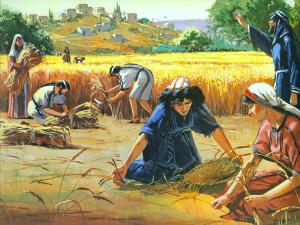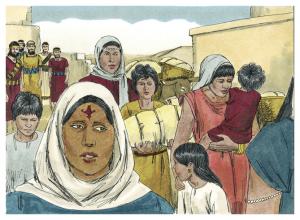Introduction to the series

Why did Jesus die? Jesus died to save us from sin and death. In the Gospel of Luke Jesus has his own an answer to this question. He explains it to two disciples as they walk to Emmaus, unaware of the resurrection, which has recently taken place. Unfortunately, he doesn’t explain it to us, Luke’s readers. In a series of posts I will make some guesses about the Scriptures that Jesus might have “opened up” for those two disciples. On the way I will also address a question which has never gotten an official answer: Jesus died to save us. How does that work exactly?
Table of Contents
- Achan Suffers for the Israelites
- Rene Girard, Rivalry, the Scapegoat, Sacred Violence
- Two Original Sin Stories
- Sacrifice Isaac? What Got Into Abraham?
- Cain and Abel, the Rivals
- Jephthah and His Daughter, a Sacrificial Victim
- King David: “Everything is Holy Now”
- More Kings: Nothing is Holy Now
- Ezra: Tribal Identity vs. Compassion
- Ruth, a Romantic Tale of a Victim who Conquers
- Jonah, a Tall Tale about a Prophet who Fails, Like Us
- Conclusion: Why the Messiah had to Suffer
I was surprised to learn, as a student at Catholic University many years ago, that the Church has no doctrine on how salvation works. Officially the Church doesn’t know how it Jesus’ death works or whether it had to be that way.
There are lots of opinions with interesting names: Ransom, Christus Victor, and—very popular over the last millennium—Penal Substitutionary Atonement. Respectively; Jesus pays the devil to free us from that tyrant’s hold, Jesus conquers and despoils the devil without paying anything, Jesus’ suffering pays God the price for our offenses because it’s too high for us to pay.
On the way to Emmaus
For the moment I want to dispense with theories and focus on what I learn and what I can only guess from a story in Luke’s Gospel:
Two disciples are on their way to Emmaus Easter Sunday morning. They must have been pondering Jesus’ death, unaware that he has risen. All of a sudden Jesus overtakes them, though they don’t recognize him. There are the usual greetings. The disciples explain to the stranger the reason for their sadness and confusion. They walk on together and Jesus “opens the Scriptures” for them, explaining why the Messiah had to suffer. (Luke 24:13-32)
The familiar story goes on; but if you’re like me, you realized something is missing. Luke doesn’t say which of the Scriptures Jesus opens up on the way to Emmaus or what he has to say about them. I guess Luke’s community did its own opening up of the Scriptures, and Luke figured they were doing it well enough. It leaves us the job of examining the Scriptures ourselves. I suppose that can be done in many ways.
In a series of posts I will look at stories of death and suffering in Jesus’ Scriptures and try to find where in the stories Jesus would have located himself. I’ll include the very first death that the Bible records, when God sewed a decent set of clothes for some wayward children before sending them out of the Garden of Eden. God had to kill some well-loved animals to do that. On the way I’ll pass through some other sacrifices in the Old Testament, famous and not-so famous, noble and not-so-noble. As an example of the last, I’m thinking of Jephthah’s sacrifice of his daughter in the book of Judges.
From all of these I hope to gather some understanding of Jesus’ sacrifice on the cross. I will find help in the work of René Girard on rivalry and the scapegoat. If you have not yet learned about this interesting thinker, I hope these posts may be a fair introduction. You can find out about Girard here, where Bishop Barron calls Girard a new “Father of the Church.” Artur Rosman has blogged about Girard on his site, Cosmos the in Lost, and Richard Beck as well in Experimental Theology.
The Good News
Luke concludes his Emmaus story with the disciples marveling to each other:
Were not our hearts burning within us while he spoke to us on the way and opened the scriptures to us? (24:32)
It’s too much to suppose that hearts will be burning as a result of my efforts in this investigation. There is one thing in particular that I’m looking for, though. I’d like not to have to think of God as being so horribly offended by human sin that only the death of his own Son on the cross could be repayment enough. We dishonor God by sin, but God may be less hung up on honor than we often are. Maybe God doesn’t need repayment. After all, we humans are sometimes able to forgive each other without inflicting punishment or exacting restitution. Frankly, I don’t like Penal Substitutionary Atonement.
“The Good News is only good.” (I don’t know who I’m quoting here.) It’s not only good after you get through the bad part. Though bad things happen, God wills only good and pleasant things for us, the beloved ones. I don’t think God willed bad things for his Son on the way to good things for everyone else. I don’t think we serve God’s honor well when we imagine a divine evener of scores.
In this series I’m taking an imaginary walk with Jesus to Emmaus. I hope to hear from Jesus’ Scriptures a little of what made the disciples’ hearts burn even before they knew about the resurrection.











